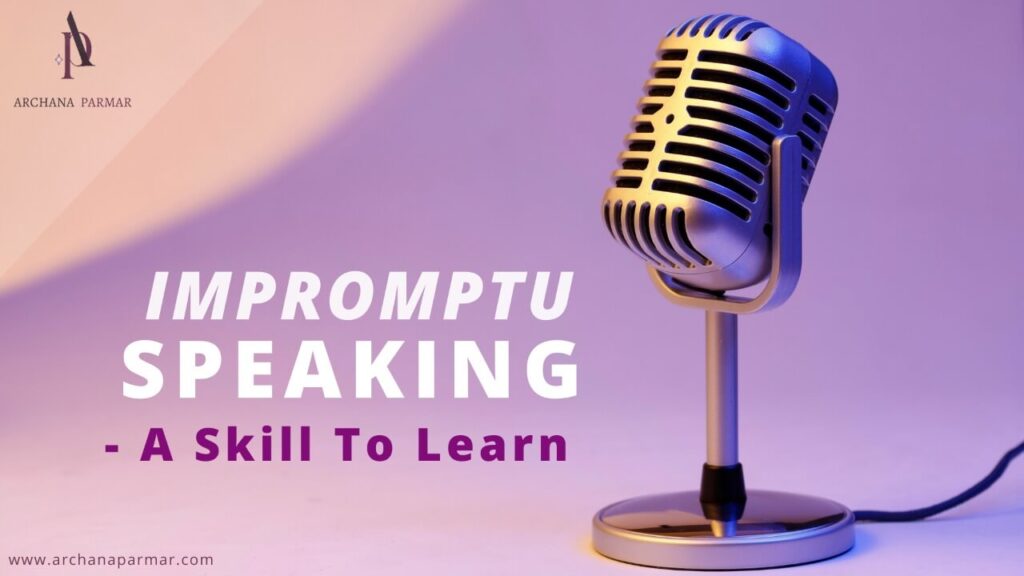What is impromptu speaking? Impromptu speaking is giving an unprepared talk. The typical characteristic of this form of speech is the unprepared delivery and the suddenness with which a person is confronted with a speech situation. Impromptu speaking is often conducted at those times when a person is called upon without warning ―to say a few words mostly at social/professional gatherings. Many people assume that impromptu speaking is easy. In reality impromptu speaking is extremely difficult. There are methods, however, if used properly, will enable a person to perform acceptably on the spur of the moment. The thought of public speaking intimidates many people. This fear can be reduced to a good extent when there is time to prepare and practice before getting up in front of an audience. What happens, though, when there is not time to prepare? When you are asked to speak without notice? This can make the most confident presenters nervous. The key to success in these situations is to have strategies you can use to compose your thoughts quickly and communicate the message clearly. Becoming skilled at impromptu speaking can give you the self-confidence you need to give a last-minute presentation, sail through a challenging meeting, or convince others of your ideas. You can build your personal brand when you learn to speak effectively under pressure. It can also equip you with the techniques to conduct a successful question and answer session or make important connections at a networking event. By developing this skill, you can learn to speak with eloquence, humor and confidence, and you’ll ensure that you can communicate your messages clearly. This can be very advantageous as you pursue future leadership roles in near future. The easiest way to prepare for impromptu situations is to anticipate. Anticipating situations where you may be asked to speak unexpectedly. However, it certainly is not practically possible to anticipate every possible situation in your personal as well as professional life, so having a couple strategies to deal with those unexpected situations or to be able to handle those situations effectively, it is better to anticipate, prepare and practice for an unforeseen opportunity to speak. While preparing for these impromptu conversations, consider the two most common scenarios that people face: Being asked to share your thoughts, answer some questions Give an update, on a project/filling in for someone, without being told ahead of time. How would you feel if you face either of these situations? How do you deal these? What do you do? What do you say? How do you say it? What if you can’t think of anything worthwhile to say? ***** Let’s take you through this, for that, start with brainstorming… You may have many ideas, thoughts, expressions, fears, anxiety and opinions running through your mind when you are chosen to speak in front of a group. The first thing you must must and must do is to calm yourself down in order to convey your thoughts in a coherence and cohesion. Take a deep breath or two. That should always be the first thing to do. A common mistake most people make is that they start speaking before they have gathered their thoughts. Give yourself enough time absorb and observe the question or topic you are supposed to talk about. These deep breaths are strategically put to help you collect yourself and your ideas. It slows you down, relaxes you, and makes you appear more in control of the situation. As a personal brand you don’t want to project yourself as overtly anxious/nervous/perplexed. In this short time span, or this window of opportunity, try to interpret what is being asked in the question or request and why you? Repeat the question yourself before answering or better if you can rephrase the question or changing it slightly into what you want to answer. Ask for clarification if you have not understood the question, it will help you be more specific about the answer. At this point you may even ask the speaker to explain it in simpler words. Deal with one aspect/one point of view/ one topic and one supporting piece of information at a time. Remember: This technique gives you focus and allows you to answer accurately and with conviction. Say it clearly. Do remember: the way you say something is almost as important as what you say. Speak in a confident voice (not just a loud voice!) Use pauses strategically to emphasize a point Avoid sounding monotonous Maintain the eye contact with your audience When you convert your thoughts into coherent speech you are making a conscious effort of making yourself heard. You come across as being confident, persuasive and trustworthy. So by now, you might have had a fairly good idea how to handle situations where you are asked to respond to a question/situation extempore. Moving on to the situation where you are being asked to deliver an extempore speech. It is indeed difficult to prepare for an unknown topic, but you can prepare a method to deal with such encounters. One system of doing this is to have in mind various orders by which to develop your ideas. For example, you are asked to talk about ‘Family’. Here, you can talk about the this term indifferent contexts- family as social unit, your family members, values, importance of having a family, structure of family (joint/nuclear), extended family, professional family- your organization/department/unit. In addition to all these, you may also talk about things like: Why is this topic important to your audience? Give a back-story of the importance and relevance of having a family. What are the overall effects of your topic (such as,________) on your audience, the state, the nation, the world? What are the effects geographically? What are the effects politically? What are the effects economically? What are the effects socially? What are the effects religiously? What are the effects educationally? What are the effects morally? What are the effects agriculturally? What are the effects emotionally and



